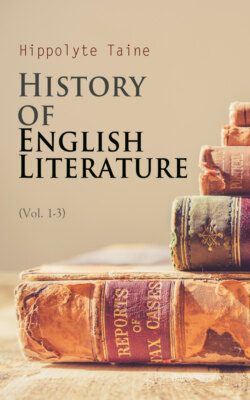Читать книгу History of English Literature (Vol. 1-3) - Taine Hippolyte - Страница 38
На сайте Литреса книга снята с продажи.
SECTION III.—Popular Festivals
ОглавлениеTable of Contents
To vent the feelings, to satisfy the heart and eyes, to set free boldly on all the roads of existence the pack of appetites and instincts, this was the craving which the manners of the time betrayed. It was "merry England," as they called it then. It was not yet stern and constrained. It expanded widely, freely, and rejoiced to find itself so expanded. No longer at court only was the drama found, but in the village. Strolling companies betook themselves thither, and the country folk supplied any deficiencies, when necessary. Shakespeare saw, before he depicted them, stupid fellows, carpenters, joiners, bellows-menders, play Pyramus and Thisbe, represent the lion roaring as gently as any sucking dove, and the wall, by stretching out their hands. Every holiday was a pageant, in which townspeople, workmen, and children bore their parts. They were actors by nature. When the soul is full and fresh, it does not express its ideas by reasonings; it plays and figures them; it mimics them; that is the true and original language, the children's tongue, the speech of artists, of invention, and of joy. It is in this manner they please themselves with songs and feasting, on all the symbolic holidays with which tradition has filled the year.[284] On the Sunday after Twelfth-night the laborers parade the streets, with their shirts over their coats, decked with ribbons, dragging a plough to the sound of music, and dancing a sword-dance; on another day they draw in a cart a figure made of ears of corn, with songs, flutes, and drums; on another, Father Christmas and his company; or else they enact the history of Robin Hood, the bold archer, around the May-pole, or the legend of Saint George and the Dragon. We might occupy half a volume in describing all these holidays, such as Harvest Home, All Saints, Martinmas, Sheepshearing, above all Christmas, which lasted twelve days, and sometimes six weeks. They eat and drink, junket, tumble about, kiss the girls, ring the bells, satiate themselves with noise: coarse drunken revels, in which man is an unbridled animal, and which are the incarnation of natural life. The Puritans made no mistake about that. Stubbes says:
"First, all the wilde heades of the parishe, conventying together, chuse them a ground capitaine of mischeef, whan they innoble with the title of my Lorde of Misserule, and hym they crown with great solemnitie, and adopt for their kyng. This kyng anoynted, chuseth for the twentie, fourtie, three score, or a hundred lustie guttes like to hymself to waite uppon his lordely maiestie.... Then have they their hobbie horses, dragons, and other antiques, together with their baudie pipers and thunderyng drommers, to strike up the devilles daunce withall: then marche these heathen companie towardes the churche and churche-yarde, their pipers pipyng, their drommers thonderyng, their stumppes dauncyng, their belles rynglyng, their handkerchefes swyngyng about their heads like madmen, their hobbie horses and other monsters skirmishyng amongest the throng; and in this sorte they goe to the churche (though the minister be at praier or preachyng), dauncyng, and swingyng their handkercheefes over their heades, in the churche, like devilles incarnate, with such a confused noise, that no man can heare his owne voice. Then the foolishe people they looke, they stare, they laugh, they fleere, and mount upon formes and pewes, to see these goodly pageauntes, solemnized in this sort. Then after this, aboute the churche they goe againe and againe, and so forthe into the churche-yarde, where they have commonly their sommer haules, their bowers, arbours, and banquettyng houses set up, wherein they feaste, banquet, and daunce all that daie, and peradventure all that night too. And thus these terrestriall furies spend the Sabbaoth daie!... An other sorte of fantasticall fooles bringe to these helhoundes (the Lorde of Misrule and his complices) some bread, some good ale, some newe cheese, some olde cheese, some custardes, some cakes, some flaunes, some tartes, some creame, some meate, some one thing, some an other."
He continues thus:
"Against Maie, every parishe, towne and village essemble themselves together, bothe men, women, and children, olde and yong, even all indifferently; they goe to the woodes where they spende all the night in pleasant pastymes, and in the mornyng they returne, bringing with them birch, bowes, and branches of trees, to deck their assemblies with-all. But their cheefest iewell they bringe from thence is their Maie poole, whiche they bring home with great veneration, as thus: They have twenty or fourtie yoke of oxen, every ox havyng a sweete nosegaie of flowers tyed on the tippe of his homes, and these oxen, drawe home this Maie poole (this stinckyng idoll rather)... and thus beyng reared up, they strawe the grounde aboute, binde greene boughes about it, sett up sommer haules, bowers, and arbours hard by it; and then fall they to banquet and feast, to leape and daunce aboute it, as the heathen people did at the dedication of their idolles.... Of a hundred maides goyng to the woode over night, there have scarcely the third parte returned home againe undefiled."[285]
"On Shrove Tuesday," says another,[286] "at the sound of a bell, the folk become insane, thousands at a time, and forget all decency and common-sense.... It is to Satan and the devil that they pay homage and do sacrifice to in these abominable pleasures." It is in fact to nature, to the ancient Pan, to Freya, to Hertha, her sisters, to the old Teutonic deities who survived the Middle Ages. At this period, in the temporary decay of Christianity, and the sudden advance of corporal well-being, man adored himself, and there endured no life within him but that of paganism.
